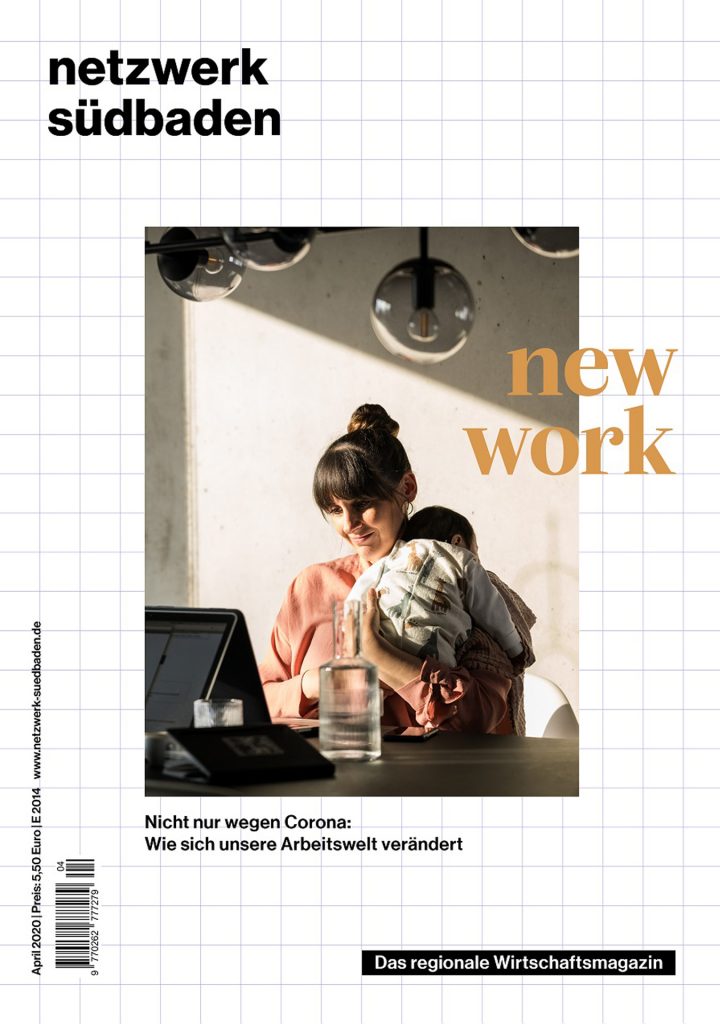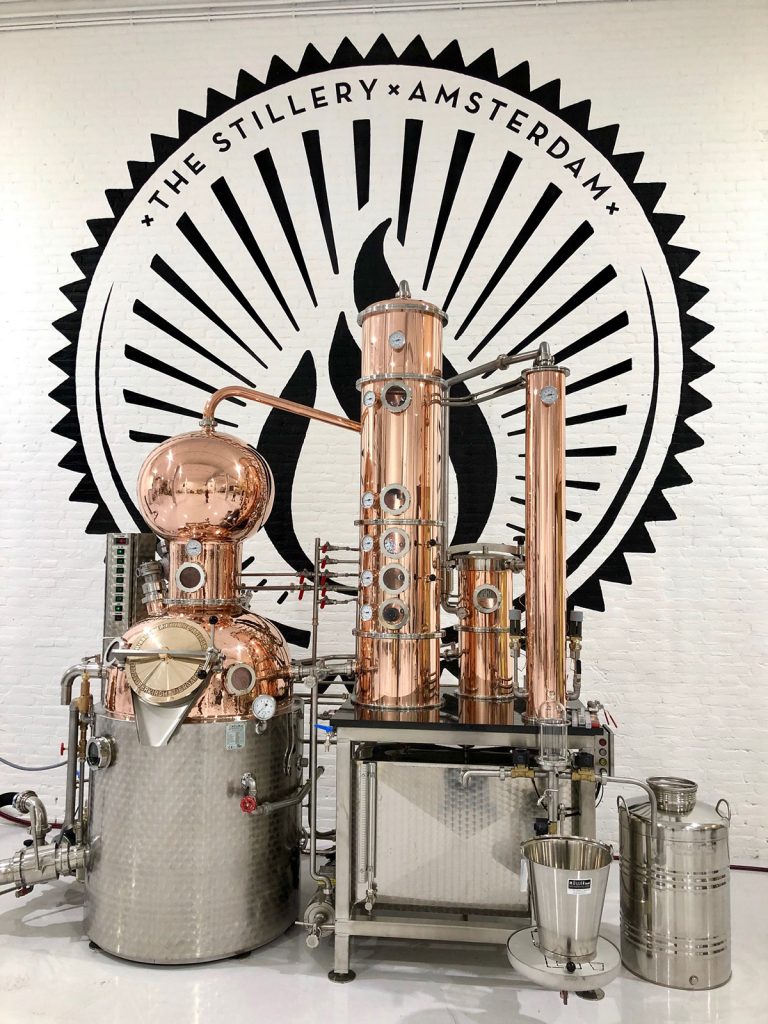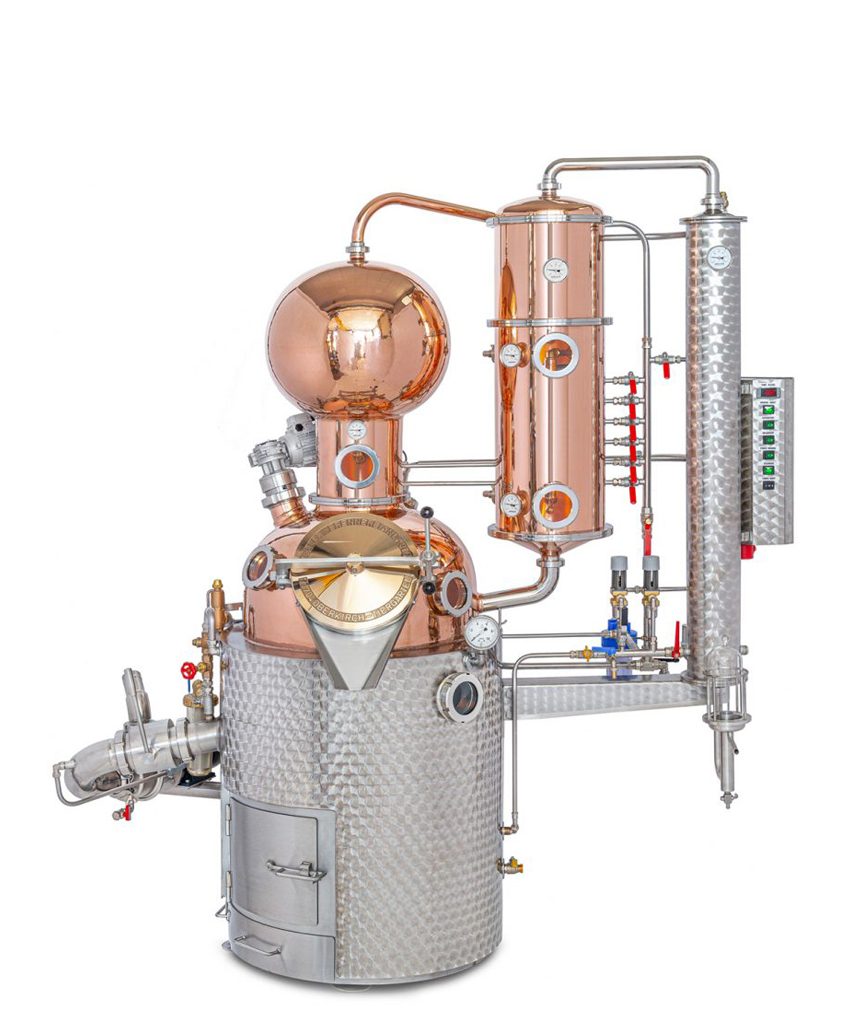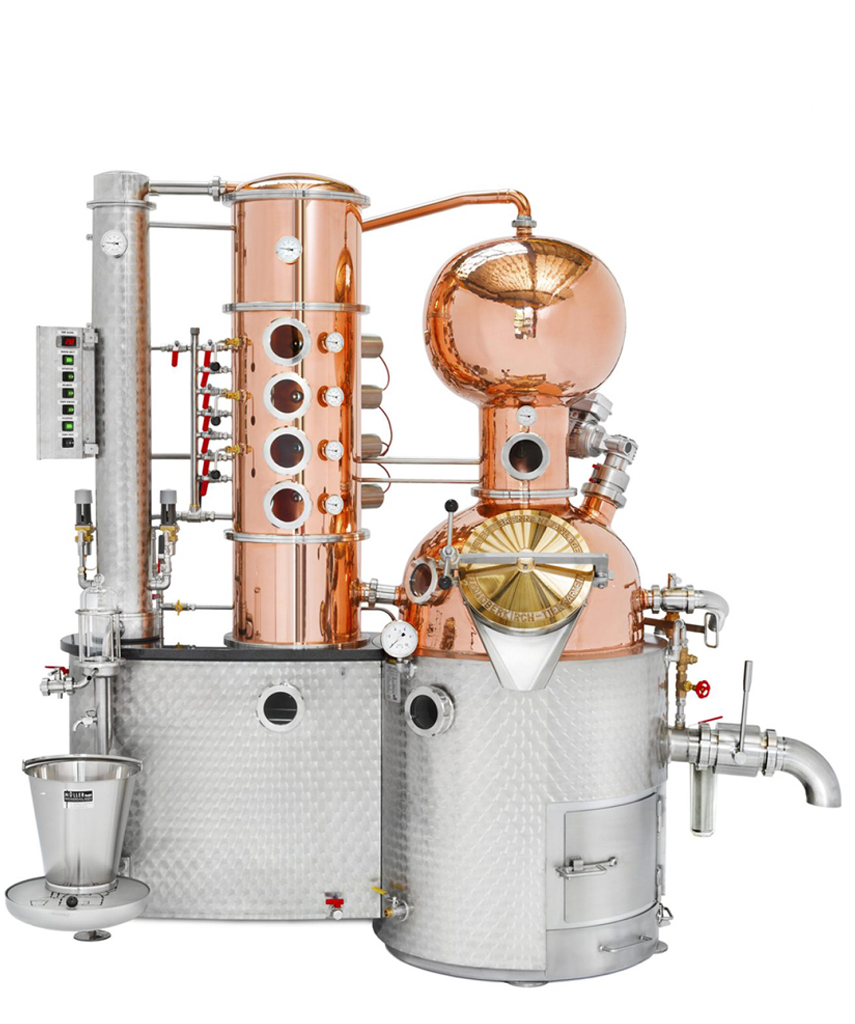Read the article now:
April 29, 2020 / Source: network south Baden
Their last name is the most common in Germany, but their craft is rare: the Müller family business in Oberkirch-Tiergarten is one of only four distillery manufacturers left in Germany. In addition to tradition, the Ortenau-based company impresses above all with its innovative work - which is how it achieved a worldwide breakthrough.
BY ANNA-LENA GRÖNER
In the middle of the 800-strong village of Oberkirch-Tiergarten in the Ortenau region stands the Müller Brennereianlagen GmbH. Exactly here, 90 years ago, the great-grandfather Franz Müller built up a classic blacksmith's store. At that time, mainly horseshoes and wagon wheels were produced under hot flames. It was not until after the Second World War that the family business turned its focus to distilleries. Father Bernd Müller, master blacksmith and current managing director, has continued to specialize and expand the company since the 1960s.
Three years ago, the two sons Sebastian (30) and Lukas (28) joined the company, the youngest son, Clemens (23), is currently studying automation technology. Nothing stands in the way of a handover to the fourth generation. Despite traditional craft the Müller family business is brave enough for new paths, always leaving its comfort zone and investing above all in its own employees. Most of the total of 15 colleagues were trained at the company.
In February, for all the courage and effort, there was a reward from the Chamber of Crafts (HWK) Freiburg: it awarded Müller Brennereianlagen GmbH the "Craft company of the year 2019". "In this highly specialized field, the Müllers successfully combine the tried and tested with new innovative ideas," said the HWK, explaining its choice. "Our work is characterized by craftsmanship, a feel for the materials and, of course, talent and skill," says Sebastian Müller, who studied business administration, is a trained burner and is responsible for sales at the company.
From Oberkirch into the world
Particularly in his field of work, you can't stick to traditions, but have to remain agile - there's nothing less than survival at stake. So Müllers have significantly expanded their customer radius in recent years and left familiar ground behind. Although the Baden Small and fruit distillers association nearly 15,000 members, which means that Baden can be counted as the region with the most distilleries in one place worldwide - even Scotland and Kentucky can't keep up with that.
But with the abolition of the spirits monopoly at the end of 2017, many distillers across Germany have given up their trade. Sebastian Müller sees the frequent lack of company succession as another reason for the local decline. Even if most Müller plants are still used in the region, the demand here seems to be covered for the time being. In addition, anyone who has purchased a Müller distillery - starting at 30,000 euros - will have something to gain from it for the next 20 to 30 years. In the meantime, 70 percent of Müller's copper and steel work goes abroad.
"Before my brother and I joined the company in 2016, our equipment was mainly sold in Germany and Europe. This was mainly due to my father's lack of English," says the 30-year-old salesman. The younger generation brings the necessary language skills. In the meantime, the company's own website can also be displayed in English, and Müller delivers from Oberkirch-Tiergarten to Hong Kong, Vietnam, the USA, Canada, Kenya and Ethiopia.
The longest journey of a Müller plant was to Tasmania, at the other end of the world. In order to cope with these new working conditions, new working methods and techniques were required in addition to a knowledge of English. After all, each plant is unique, made according to the special wishes of the customer. If measurements cannot be taken on site, the customers send their construction plans to Oberkirch by e-mail, "we read them in and draw the plant digitally so that it fits the customer and he can get an idea of how it will look afterwards," says Sebastian Müller.
Logistical effort
Logistically, such orders are a great challenge and take a lot of time: Before the plant can be shipped, it is completely assembled once at the plant in Ortenau, then disassembled into its individual parts, safely loaded into containers and shipped by logistics companies. "For on-site assembly, we travel in person and take enough time to discuss the plant with the customers and instruct them in the firing process," says Müller, a business economist.
This intensive customer care has already resulted in many friendships all over the world and the company's own home bar is always well stocked, he says. Back in Oberkirch, Müllers can also help their customers remotely: in addition to classic systems that are operated manually, the craft company manufactures stills with digital controls that make remote maintenance possible. All that is needed is a secure Internet connection.
The combination of modern capabilities and honest craftsmanship pays off. It takes two to three weeks to manufacture a distillation plant, but customers have to be patient for longer: "Demand for our plants is very high. We currently have delivery times of just under a year," says Müller Junior. Due to the Corona situation, it could soon take even longer. "For example, we should have delivered a plant to India," says Sebastian Müller, "but India has imposed an import ban, so it's still here now. We also source some components from suppliers in Italy, most of which are now at a production standstill."
But they had received material in time and are therefore still relaxed. The view into the further future of Müller Brennerei GmbH is also relaxed: The handover to the fourth generation will take place in the next four to five years, then the young sons would like to make further changes in the structure of the company and the way of working, after all "there is always room for optimization".
The magazine network south Baden writes in the current issue, under the title "The great burning around the world", about us.
Learn more now, on the pages of the South Baden Network
Read the article now:
April 29, 2020 / Source: network south Baden
Their last name is the most common in Germany, but their craft is rare: the Müller family business in Oberkirch-Tiergarten is one of only four distillery manufacturers left in Germany. In addition to tradition, the Ortenau-based company impresses above all with its innovative work - which is how it achieved a worldwide breakthrough.
BY ANNA-LENA GRÖNER
In the middle of the 800-strong village of Oberkirch-Tiergarten in the Ortenau region stands the Müller Brennereianlagen GmbH. Exactly here, 90 years ago, the great-grandfather Franz Müller built up a classic blacksmith's store. At that time, mainly horseshoes and wagon wheels were produced under hot flames. It was not until after the Second World War that the family business turned its focus to distilleries. Father Bernd Müller, master blacksmith and current managing director, has continued to specialize and expand the company since the 1960s.
Three years ago, the two sons Sebastian (30) and Lukas (28) joined the company, the youngest son, Clemens (23), is currently studying automation technology. Nothing stands in the way of a handover to the fourth generation. Despite traditional craft the Müller family business is brave enough for new paths, always leaving its comfort zone and investing above all in its own employees. Most of the total of 15 colleagues were trained at the company.
In February, for all the courage and effort, there was a reward from the Chamber of Crafts (HWK) Freiburg: it awarded Müller Brennereianlagen GmbH the "Craft company of the year 2019". "In this highly specialized field, the Müllers successfully combine the tried and tested with new innovative ideas," said the HWK, explaining its choice. "Our work is characterized by craftsmanship, a feel for the materials and, of course, talent and skill," says Sebastian Müller, who studied business administration, is a trained burner and is responsible for sales at the company.
From Oberkirch into the world
Particularly in his field of work, you can't stick to traditions, but have to remain agile - there's nothing less than survival at stake. So Müllers have significantly expanded their customer radius in recent years and left familiar ground behind. Although the Baden Small and fruit distillers association nearly 15,000 members, which means that Baden can be counted as the region with the most distilleries in one place worldwide - even Scotland and Kentucky can't keep up with that.
But with the abolition of the spirits monopoly at the end of 2017, many distillers across Germany have given up their trade. Sebastian Müller sees the frequent lack of company succession as another reason for the local decline. Even if most Müller plants are still used in the region, the demand here seems to be covered for the time being. In addition, anyone who has purchased a Müller distillery - starting at 30,000 euros - will have something to gain from it for the next 20 to 30 years. In the meantime, 70 percent of Müller's copper and steel work goes abroad.
"Before my brother and I joined the company in 2016, our equipment was mainly sold in Germany and Europe. This was mainly due to my father's lack of English," says the 30-year-old salesman. The younger generation brings the necessary language skills. In the meantime, the company's own website can also be displayed in English, and Müller delivers from Oberkirch-Tiergarten to Hong Kong, Vietnam, the USA, Canada, Kenya and Ethiopia.
The longest journey of a Müller plant was to Tasmania, at the other end of the world. In order to cope with these new working conditions, new working methods and techniques were required in addition to a knowledge of English. After all, each plant is unique, made according to the special wishes of the customer. If measurements cannot be taken on site, the customers send their construction plans to Oberkirch by e-mail, "we read them in and draw the plant digitally so that it fits the customer and he can get an idea of how it will look afterwards," says Sebastian Müller.
Logistical effort
Logistically, such orders are a great challenge and take a lot of time: Before the plant can be shipped, it is completely assembled once at the plant in Ortenau, then disassembled into its individual parts, safely loaded into containers and shipped by logistics companies. "For on-site assembly, we travel in person and take enough time to discuss the plant with the customers and instruct them in the firing process," says Müller, a business economist.
This intensive customer care has already resulted in many friendships all over the world and the company's own home bar is always well stocked, he says. Back in Oberkirch, Müllers can also help their customers remotely: in addition to classic systems that are operated manually, the craft company manufactures stills with digital controls that make remote maintenance possible. All that is needed is a secure Internet connection.
The combination of modern capabilities and honest craftsmanship pays off. It takes two to three weeks to manufacture a distillation plant, but customers have to be patient for longer: "Demand for our plants is very high. We currently have delivery times of just under a year," says Müller Junior. Due to the Corona situation, it could soon take even longer. "For example, we should have delivered a plant to India," says Sebastian Müller, "but India has imposed an import ban, so it's still here now. We also source some components from suppliers in Italy, most of which are now at a production standstill."
But they had received material in time and are therefore still relaxed. The view into the further future of Müller Brennerei GmbH is also relaxed: The handover to the fourth generation will take place in the next four to five years, then the young sons would like to make further changes in the structure of the company and the way of working, after all "there is always room for optimization".
The magazine network south Baden writes in the current issue, under the title "The great burning around the world", about us.
Learn more now, on the pages of the South Baden Network
Read the article now:
April 29, 2020 / Source: network south Baden
Their last name is the most common in Germany, but their craft is rare: the Müller family business in Oberkirch-Tiergarten is one of only four distillery manufacturers left in Germany. In addition to tradition, the Ortenau-based company impresses above all with its innovative work - which is how it achieved a worldwide breakthrough.
BY ANNA-LENA GRÖNER
In the middle of the 800-strong village of Oberkirch-Tiergarten in the Ortenau region stands the Müller Brennereianlagen GmbH. Exactly here, 90 years ago, the great-grandfather Franz Müller built up a classic blacksmith's store. At that time, mainly horseshoes and wagon wheels were produced under hot flames. It was not until after the Second World War that the family business turned its focus to distilleries. Father Bernd Müller, master blacksmith and current managing director, has continued to specialize and expand the company since the 1960s.
Three years ago, the two sons Sebastian (30) and Lukas (28) joined the company, the youngest son, Clemens (23), is currently studying automation technology. Nothing stands in the way of a handover to the fourth generation. Despite traditional craft the Müller family business is brave enough for new paths, always leaving its comfort zone and investing above all in its own employees. Most of the total of 15 colleagues were trained at the company.
In February, for all the courage and effort, there was a reward from the Chamber of Crafts (HWK) Freiburg: it awarded Müller Brennereianlagen GmbH the "Craft company of the year 2019". "In this highly specialized field, the Müllers successfully combine the tried and tested with new innovative ideas," said the HWK, explaining its choice. "Our work is characterized by craftsmanship, a feel for the materials and, of course, talent and skill," says Sebastian Müller, who studied business administration, is a trained burner and is responsible for sales at the company.
From Oberkirch into the world
Particularly in his field of work, you can't stick to traditions, but have to remain agile - there's nothing less than survival at stake. So Müllers have significantly expanded their customer radius in recent years and left familiar ground behind. Although the Baden Small and fruit distillers association nearly 15,000 members, which means that Baden can be counted as the region with the most distilleries in one place worldwide - even Scotland and Kentucky can't keep up with that.
But with the abolition of the spirits monopoly at the end of 2017, many distillers across Germany have given up their trade. Sebastian Müller sees the frequent lack of company succession as another reason for the local decline. Even if most Müller plants are still used in the region, the demand here seems to be covered for the time being. In addition, anyone who has purchased a Müller distillery - starting at 30,000 euros - will have something to gain from it for the next 20 to 30 years. In the meantime, 70 percent of Müller's copper and steel work goes abroad.
"Before my brother and I joined the company in 2016, our equipment was mainly sold in Germany and Europe. This was mainly due to my father's lack of English," says the 30-year-old salesman. The younger generation brings the necessary language skills. In the meantime, the company's own website can also be displayed in English, and Müller delivers from Oberkirch-Tiergarten to Hong Kong, Vietnam, the USA, Canada, Kenya and Ethiopia.
The longest journey of a Müller plant was to Tasmania, at the other end of the world. In order to cope with these new working conditions, new working methods and techniques were required in addition to a knowledge of English. After all, each plant is unique, made according to the special wishes of the customer. If measurements cannot be taken on site, the customers send their construction plans to Oberkirch by e-mail, "we read them in and draw the plant digitally so that it fits the customer and he can get an idea of how it will look afterwards," says Sebastian Müller.
Logistical effort
Logistically, such orders are a great challenge and take a lot of time: Before the plant can be shipped, it is completely assembled once at the plant in Ortenau, then disassembled into its individual parts, safely loaded into containers and shipped by logistics companies. "For on-site assembly, we travel in person and take enough time to discuss the plant with the customers and instruct them in the firing process," says Müller, a business economist.
This intensive customer care has already resulted in many friendships all over the world and the company's own home bar is always well stocked, he says. Back in Oberkirch, Müllers can also help their customers remotely: in addition to classic systems that are operated manually, the craft company manufactures stills with digital controls that make remote maintenance possible. All that is needed is a secure Internet connection.
The combination of modern capabilities and honest craftsmanship pays off. It takes two to three weeks to manufacture a distillation plant, but customers have to be patient for longer: "Demand for our plants is very high. We currently have delivery times of just under a year," says Müller Junior. Due to the Corona situation, it could soon take even longer. "For example, we should have delivered a plant to India," says Sebastian Müller, "but India has imposed an import ban, so it's still here now. We also source some components from suppliers in Italy, most of which are now at a production standstill."
But they had received material in time and are therefore still relaxed. The view into the further future of Müller Brennerei GmbH is also relaxed: The handover to the fourth generation will take place in the next four to five years, then the young sons would like to make further changes in the structure of the company and the way of working, after all "there is always room for optimization".




